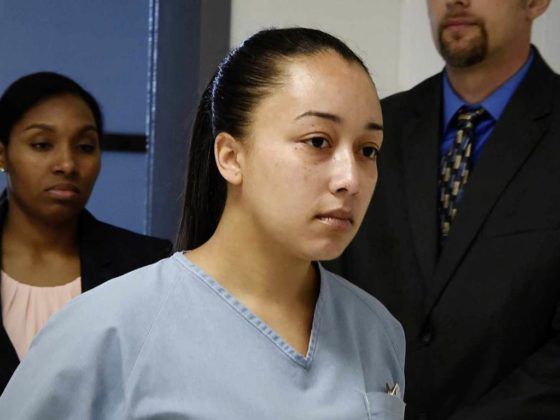I wonder how women are supposed to navigate this world where the judicial system is not on our side. Where we must be polite to the strangers following us home so that they don’t kill us. Where we must stay in dangerous relationships because, statistically, our chance of being murdered dramatically increases once we leave.
Earlier this week Tennessee governor Bill Haslam granted full clemency to Cyntoia Brown, the young sex-trafficked woman who shot the man who bought her. She will be released this August on parole, seeing the end of her sentence at 31 instead of 67 years old.
The news was met with celebration and relief across the country. Brown has been in prison since 2004, and celebrities like Rihanna, T.I., LeBron James, and Kim Kardashian-West publicized her case once it went to retrial in 2017. Her prison sentence and fight for clemency come at a time when an unprecedented number of women are behind bars, and according to the Correctional Association of New York, 3 in 4 of these women are survivors of domestic violence. Over 4 in 5 were sexually abused as children.
Cyntoia Brown’s release is a victory. It is also a reminder that she is the exception and not the rule as far too many women, mostly women of color, are incarcerated for taking control of their lives.
An overview of Cyntoia’s story suggests that she’s never known control until now. The 2011 documentary Me Facing Life: Cyntoia’s Story recounts her birth to Georgina, a woman who smoked crack and drank “a fifth a day, if I could get it” during her pregnancy. Georgina’s drinking and drug-taking resulted in Cyntoia developing fetal alcohol syndrome, which predisposes children to behavioral problems, rapid mood changes, and poor judgement among many other issues. After a childhood in foster care, Cyntoia ran away from her adoptive mother and met “Kut Throat,” a pimp who forced her into sexual slavery. A particularly awful scene in the documentary shows Cyntoia reading from a list of men with whom she was sexually involved and sorting each encounter into categories: rape, consensual, physically abusive, drunk or high.
After being sold to a man named Johnny Allen for $150, she spotted a gun cabinet in Allen’s home and listened to him repeatedly brag about what an excellent shooter he was. She killed him and notified the police the next day.
Self-defense pleas are as old as human history. The Greek orator Antiphon, in his third tetralogy, wrote speeches from both plaintiff and defendant regarding the killing of a man during a drunken brawl. Though the plaintiff defined the action as murder, while the defendant claimed that he feared for his life against a man much more intoxicated and violent. The debate outlined by the Roman orator Cicero continues today: “Because that which has been done appears in a different light to different people, one calls it by one name and another by another.”
But conventional wisdom surrounding self-defense plays out very differently depending on who is involved. In the 21st century, self-defense is still a boots-and-spurs don’t tread on me means of protecting one man’s life or property from another. It is the force that drives men fearful of their government to form militias. It is the belief, backed by Floridian law, that you can shoot a black kid in a hoodie if he frightens you at night or a black man for stealing a parking space.
When women are involved, self-defense suddenly turns into the riddle of the Sphinx. We ask women why they didn’t fight back during a rape or attack and conclude that if they didn’t retaliate, then they must not have truly feared for their lives. We cheer for heroines like Lisbeth Salander who get revenge on their rapists and find freedom. But when a sex-trafficked teenager takes matters into her own hands to kill a dangerous man before he can kill her, our judicial system gives her life in prison. Even during his clemency statement, Governor Haslam felt it necessary to deem Brown’s actions “a horrific crime.”
Wendy Martinez was attacked in D.C.’s Logan Circle while jogging, and it cost her her life. Letoya Ramseure was attacked in her Philadelphia home by a former lover, took his gun before he could shoot her, and was charged with third-degree murder. I wonder how women are supposed to navigate this world where the judicial system is not on our side. Where we must be polite to the strangers following us home so that they don’t kill us. Where we must stay in dangerous relationships because, statistically, our chance of being murdered dramatically increases once we leave.
If Letoya Ramseure and women like her have committed horrific crimes, then we must ask about the horrific crimes of forcing a minor into prostitution, buying that minor from a pimp, and threatening her with a collection of firearms. For all the praise of how hard Brown has worked to “remake herself” while in prison, Governor Haslam has not acknowledged those responsible for her suffering in the first place. He has not recognized that our prisons are full of Cyntoia Browns, each one having chosen between a life of abuse or a life waiting for freedom that may never come.
Chelsea Cristene is an international student adviser, English professor, and graduate student based in Washington, D.C. She has been published by the Good Men Project, Salon, xoJane, The Establishment, and MamaMia, and has appeared on HuffPost Live. Find her on Twitter.
Other Links:

